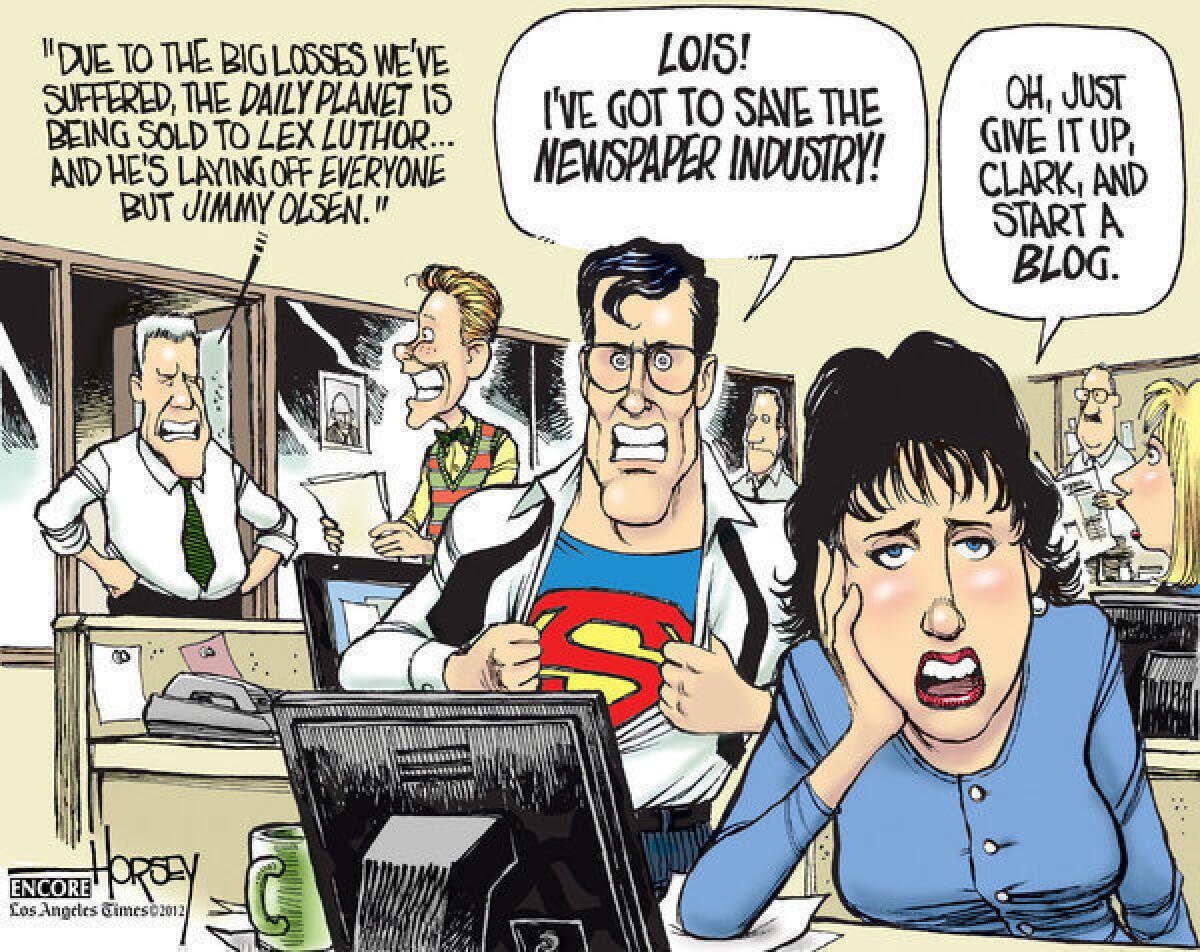Newspapers have a future, if they can avoid being ‘click whores’

- Share via
“What’s black and white and read all over?” That is the setup for what used to be the first joke learned by most every American kid. These days, delivering the punch line would leave the kids bewildered. They might just say, “What’s a newspaper?”
In our new media age, that is not a question with an obvious answer. Ask the people in New Orleans who just found out their venerable Times-Picayune will no longer be available in print every day. Based in a city and state with a perennially high level of corruption and dysfunction, the Times-Picayune has been a powerful and admired community watchdog. The question is, will it be as effective with a smaller staff and just three days of print publication a week? And there is a bigger question, one that applies to the newspaper industry as a whole: Can printless watchdogs still have teeth?
Newspapers are different from most other businesses because one of their paramount functions is to provide a public service that may bring no monetary return and may not even interest most of their customers. In a democracy, someone needs to keep an eye on the elected officlals, bureaucrats, business leaders, lobbyists, police and assorted shysters who have the power to mess with people’s lives. Traditional newspapers, from the big city dailies to the small town weeklies, have always had reporters who make it their mission to protect the public interest. Often, they write important stories that few people read -- coverage of state legislatures, for instance. But those being watched by the watchdogs read those stories and it tends to keep them honest.
In the past, newspapers were so profitable that, so it was said, any fool could get rich owning one. That made it fairly easy for a publisher to pay for investigative reporters, foreign correspondents and governmental news, the kind of work that is expensive, time-consuming and does not offer any obvious payback, other than a good reputation. But, with so many advertising dollars jumping to the Internet, the newspaper business model has crashed and newsroom cuts have hit everywhere. Often, the newspaper coverage that gets axed first is the stuff that appears to contribute the least to the bottom line. A glaring example is the way reporters in state capitals have become a vanishing breed.
Some think independent bloggers can pick up the slack. Yet, good as they may be, no blogger has the institutional weight of an established newspaper. A newspaper can take on the powers that be because it is one of those powers.
What about online newspapers? After all, it’s the information that matters, not the means of delivering the information. Politico is proving to be a powerful online source of news about national politics. The Huffington Post, though primarily opinion-driven, is a rich source of information. MSNBC.com does a decent job of aggregating and creating news reports.
The best online news is being done by the biggest newspapers -- the Los Angeles Times, the Washington Post, the New York Times, the Wall Street Journal. Of course, their online offering is largely a byproduct of reporting done for the print editions. Could the same quality be maintained if they were online only?
One answer to that can be found in the hometown of Microsoft and Amazon.com. Before moving to the L.A. Times, I had a long career at the Post-Intelligencer in Seattle. In 2009, after decades of winning awards and losing money, the Seattle P-I stopped print publication. About 150 talented journalists lost their jobs while 20 were kept on to reinvent the newspaper as a completely online endeavor. By some measures, seattlepi.com has been a success -– low operational costs and plenty of jazzy content -- but it is not the comprehensive newspaper it once was. And lacking the institutional weight it once had, this all-electronic publication is no longer a serious player in community affairs.
Still, there is no going back. The future of the news business is online and I suspect it will come out just fine -- as long as all involved can resist the ultimate temptation: becoming a “click whore.” For the uninitiated, that is anyone or any entity that will post any darn thing that draws lots of page views, or “clicks.” The problem here is not just the sort of “news” that is put online to chase clicks, it is the important news that is left out.
Sure, any fool can get a lot of page views by running photos of cute kittens, funny dogs, hot cheerleaders and bosomy models in bikinis. It might bring in a lot of money. It might be read all over.
But it would not be a newspaper.
More to Read
Get the L.A. Times Politics newsletter
Deeply reported insights into legislation, politics and policy from Sacramento, Washington and beyond. In your inbox twice per week.
You may occasionally receive promotional content from the Los Angeles Times.











